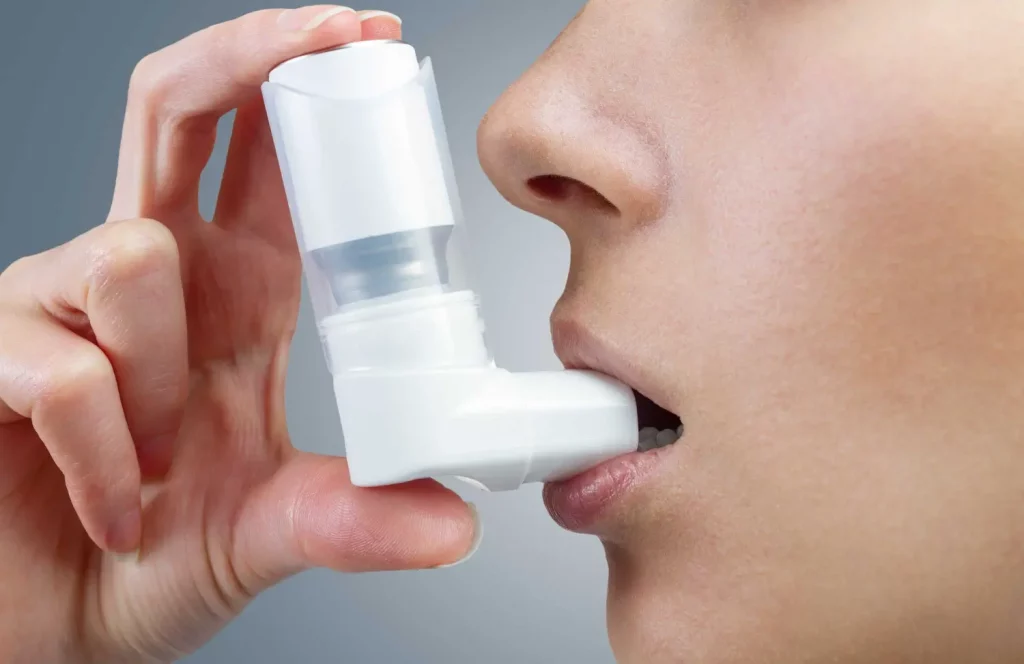Can Fog Machines Make You Sick?
This post contains affiliate links. As an Amazon Associate, we earn from qualifying purchases.
Fog machines can potentially make you sick due to exposure to glycol and mineral oil fogs. Short-term exposure can cause coughing, dry throat, headaches, dizziness, and fatigue, while long-term exposure can result in respiratory problems such as chest tightness and wheezing.
A well-made fog machine can minimize health risks, but those with asthma or allergies may be more susceptible to adverse effects. It is important to use fog machines in well-ventilated areas and follow safety guidelines to avoid slip hazards and potential respiratory and skin irritation.

Short-Term Exposure to Fogs and Smokes
Fog machines are popular in the entertainment industry for creating atmospheric effects for various performances. They emit special effects theatrical smokes, which can enhance lighting and mood. However, long-term exposure to the substances in fog fluid, including glycols and mineral oils, can cause adverse health effects, especially for people with asthma or allergies.
Even short-term exposure to fog machines can cause throat irritation, respiratory symptoms, eye irritation, and skin irritation. Here we explore the potential health risks and solutions associated with short-term exposure to fogs and smokes.
1. Eye Irritation
Exposure to fog machines, particularly glycol-based fogs, may cause eye irritation in some individuals. The solid particles in the fog fluid can settle in the eyes, leading to dryness, excessive tearing, and impaired vision. Although the effects are usually temporary, prolonged exposure to glycol-based fogs can cause long-term damage to the eyes.
To minimize the effects of eye irritation, it is advisable to wear protective eyewear when handling or working near fog machines. Limiting exposure time can also help reduce the risk of eye irritation. Additionally, staying hydrated by drinking plenty of water can alleviate the temporary effects of dry mouth and eyes.
When experiencing eye irritation caused by fog machines, it is important to avoid rubbing the eyes and to rinse them with clean water if particles have settled in them. If symptoms persist or become severe, it is recommended to seek medical attention immediately.

2. Respiratory Symptoms
Fog machines are popular in the entertainment industry for creating atmospheric effects. However, long-term exposure to the fog produced by these machines can cause respiratory symptoms. These symptoms may include coughing, chest pain, and tightness in the chest.
People with respiratory conditions, such as asthma, are at higher risk of experiencing adverse effects. Asthma attacks and bronchitis-like symptoms are some of the potential risks of exposure to fog machines.
There are different fluids used in fog machines, including glycol-based fogs, mineral oil fogs, and propylene glycol. Each of these fluids can affect respiratory health differently. Glycol-based fogs are known to cause cumulative exposure, leading to respiratory symptoms. Mineral oil fogs can cause slip hazards on dance floors, and propylene glycol can cause skin irritation.
It is important to note the potential respiratory hazards of fog machines and take precautions, such as wearing protective gear and limiting exposure time, to minimize the risks. If respiratory symptoms persist or become severe, seeking medical attention is recommended.
3. Solid Particle Exposure
Fog machines have become a staple in many events and productions as they create atmospheric effects and enhance lighting. However, the use of these machines can also pose risks to the health of those exposed to the fog. In addition to respiratory issues caused by exposure to glycol or mineral oil fogs, solid particle exposure from these machines can also be harmful.
Solid particles can be released into the air through the use of fog machines due to the heating and atomization process that creates the fog effect. These particles can range in size, with smaller particles being able to penetrate deeper into the respiratory system.
Exposure to solid particles can result in a range of symptoms including throat irritation, respiratory issues, and voice changes. These symptoms can be compounded by exposure to other harmful fluids used in fog machines and may become severe with long-term exposure.
To minimize the risk of harm from solid particle exposure, preventative measures can be taken. Wearing protective masks can aid in preventing the inhalation of these particles, and limiting exposure time can reduce the overall risk of harmful effects. It is also important to properly maintain and clean fog machines to prevent the buildup of particles and other potentially harmful substances.
Long-Term Exposure to Fogs and Smokes
Long-term exposure to fogs and smokes created by fog machines can pose potential health risks, especially when glycol-based fogs are used. This can present problems for individuals who work in the entertainment industry and are exposed to these fogs regularly.
Some of the health effects associated with exposure to these fogs include respiratory symptoms, allergic reactions, throat irritation, and skin irritation. It is important to be aware of the risks and take appropriate measures to protect oneself.
1. People With Asthma Vulnerability
People with asthma face a higher risk of respiratory problems when exposed to fog machines. This is because fog machines release particles into the air, which can trigger asthma attacks and other severe respiratory reactions.
Exposure to glycol-based fogs from smoke machines can lead to dry throat and eye irritation, while exposure to solid particles from mineral oil fogs can cause adverse respiratory effects. These effects are particularly detrimental to people with asthma, who may experience bronchitis-like symptoms or even asthma attacks after exposure to these chemicals.
Some of the most common respiratory symptoms experienced by people with asthma after exposure to fog machines include throat and voice symptoms, breathing difficulties, and coughing.
However, these risks can be minimized through proper precautions. This includes ensuring that the fog machine fluid is of a high-quality and avoiding excessive exposure. It is important to note that well-made fog machines can provide atmospheric effects that enhance theatre and film productions, without posing a significant Health Risk.

2. Cumulative Effects of Extreme Exposure
Extended and frequent exposure to various types of fog machine fluids can cause cumulative effects in individuals. The exposure limits recommended by ESTA and ANSI state that the concentration of glycols in fog machines should not exceed 100mg/m³, and propylene glycol should not exceed 10mg/m³. However, when used in moderation, triethylene glycol (TEG) has been shown to have no adverse toxic effects.
Inhaling dry ice- and liquid nitrogen-based fogs can cause breathing hazards due to reduced oxygen levels and displacement of breathable air. Proper ventilation is essential in ensuring a safe and breathable environment for artists and technicians.
The adverse health effects from fog machine fluid exposure can result in respiratory symptoms such as coughing, wheezing, and shortness of breath. Skin and eye irritation may also occur, and there is a potential for throat irritation. It is crucial to use fog machines in well-ventilated areas and to use high-quality fluids that minimize health risks.
FAQs
It is possible to be allergic to the vapor from fog fluid as it can cause irritation or allergic reactions in some people. However, fog machines are safe to use and have been used in the entertainment industry for many years without major health concerns.
Homemade fog juice, can it be considered safe? There are concerns about the potential health risks associated with the use of glycols in fog machines, especially in cases of extreme exposure. While glycerin can be used as a safer alternative, it’s important to carefully consider the ingredients used in homemade fog juice and the potential risks they may pose. In order to ensure optimal safety, it is recommended to use well-made fog machine fluid that is specifically designed for theatrical smokes and atmospheric effects.
Glycerin-based fog fluids like SimplyFog™ are a safer and more effective alternative to glycol-based fluids in entertainment and training settings. Is glycerin fog safe? Yes, glycerin fog is safe for use as it does not pose any significant health risk to individuals who are exposed to it.
A fog machine is safe for babies. However, it’s important to consider the type of fog fluid being used and to ensure that the baby is not exposed to it for an extended period of time. Opt for a glycol-free fog fluid to avoid respiratory symptoms or potential skin irritation. Additionally, make sure that the baby is kept away from the slip hazards that may occur due to the fog.
Fog machines are often used to create atmospheric effects in different industries, including the entertainment industry. Fog fluid and smoke machines are the primary components of these machines, which help create special effects for stage performances and film productions. However, the use of fog machines may pose some environmental concerns. While mist generators are confirmed to be safe, glycol-based fogs and mineral oil fogs may release solid particles that can cause slip hazards and breathing hazards.
Conclusion
In conclusion, the use of fog machines can potentially lead to adverse health effects for individuals who are exposed to the fog for extended periods of time or have pre-existing respiratory conditions.
Exposure to glycol-based fog fluids and mineral oil fogs can cause respiratory symptoms, allergic reactions, and skin irritation. This is especially true for people with asthma or those who have cumulative exposure to these substances.
It is important for individuals in the entertainment industry or those who use fog machines for special effects to be aware of the potential health risks associated with these machines and to take precautions to minimize exposure. This can include using well-made fog machines, ensuring proper ventilation, and minimizing exposure to glycols and other potentially harmful substances.






